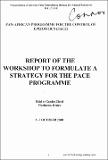REPORT OF THE WORKSHOP TO FORMULATE A STRATEGY FOR THE PACE PROGRAMME

(en=English; ar=Arabic; fr=French; pt=Portuguese)
Type
ReportItem Usage Stats
211
views
views
48
downloads
downloads
Abstract
This workshop had been included as an activity of the first work programme for the Pan-
African Programme for the Control of Epizootics (PACE) Common Services and Coordination
Units, but it had been postponed by two months. The aim of the workshop was
to draft a PACE strategy document, which, after further refinement, would be presented
to the Advisory Committee.
The PACE Programme aims to establish and strengthen sustainable epidemiological
surveillance of major epizootic diseases and safeguard animal production in Africa. It is a
complex programme that covers 32 sub-Saharan countries; it has four major thrusts and
six themes, which are represented by the technical units of the Common Services.
Participants in the workshop included the PACE technical experts and counterparts of the
Common Services from Central, Eastern and Western Africa, most of the technical staff of
the PACE Co-ordination Units in Bamako and Nairobi, and representatives of the
OAU/IBAR and the European Commission: They reviewed the process of strategy
development and examined the proposals of each Common Services Unit, using standard
criteria to screen for sustainability of programme impacts.
The financing agreement for the PACE Programme provides an outline logical framework
that orients the programme. It required development to ensure effective project
management at national and regional levels.
It became evident that, to implement the PACE Programme, close collaboration between
Units will be necessary and that this will require effective teamwork in planning,
implementation, and monitoring.
The workshop partidipantsidentified problems and constraints likely to arise during the
programme. They agreed on a range of remedial actions, most of which would b,
undertaken routinely in the course of implementation. Detailed discussions will, be held
between each Unit and the • PCU staff in the preparation of the second year's work
programme.
The aims of this workshop were partially achieved. It provided the foundation for the
development of a coherent strategy for the PACE Programme, and for the development of
work programmes, through which the PACE Common Services will provide support to
the national PACE programmes.
The participants generally regarded the workshop as satisfactory, although there was too
little time to finalize the detailed planning of the work programmes of the various units.
The moderator's report highlights the high workload and the growing concern at the delay
in the launch of the PACE Programme, especially at the national level. His
recommendations will be taken into account in plany,ing at regional and national levels. In
view of the PACE member countries' limited capabilities to develop logical frameworks, it
was recommended that the PCU provide assistance, to improve the basis for monitoring
and evaluating the programme.
Collections
- PACE Documents & Reports [158]